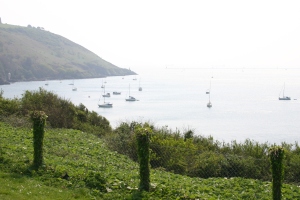
Site of Special Scientific Interest
The exposures provide a classic section through Lower Devonian to early Middle Devonian including, the Jennycliff Slates and part of the Plymouth Limestone. The sequence is fossiliferous and has yielded a variety of groups including, corals, brachiopods, bryozoa, gastropods, rare orthoconic
nautiloids, ostracods, trilobites, crinoids and fragmentary ostracoderm and acanthodian fish remains. In Jennycliff Bay this sequence us usually steeply inclined and flexured into open recumbent folds, sometimes with chevron form. In places the strata become overturned, dipping steeply to the south. Sedimentary structures such as graded bedding and cross-bedding can be used to establish the original ’way-up’ of the strata.
Access to the beach only at low tide; ensure that tide tables are consulted prior to visit. Walking close to the cliff top is potentially hazardous, especially during high winds. There is a potential hazard of falling boulders from the cliff top.
http://www.devon.gov.uk/geo-PSC.pdf (full geological article)
The bottom here is a sandy mud with a varying amount of seaweed litter. The trawl brings up a collection of shrimps, prawns, crabs, and small flat-fish, small wrasse, gobies, dragonets, and pipe-fish.



